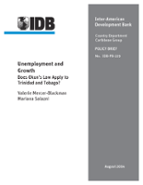Unemployment and Growth: Does Okun's Law Apply to Trinidad and Tobago?
Date
Aug 2014
Are output changes and the unemployment rate related in Trinidad and Tobago? According to the economic theory known as Okun's Law, the two variables should be negatively correlated, and for the United States this relation holds quite well. We test this hypothesis for the economy of Trinidad and Tobago using annual data between 1980 and 2012 and also look at more recent quarterly data, accounting for the fact that the energy sector is a large contributor to the country's GDP. We find that the relation between unemployment and real growth is negative but weaker in Trinidad and Tobago, compared with the United States, but seems to be clearly affected by underestimation of the unemployment rate in recent years. This exercise also reinforces the importance of improving labor and GDP statistics in the country.



